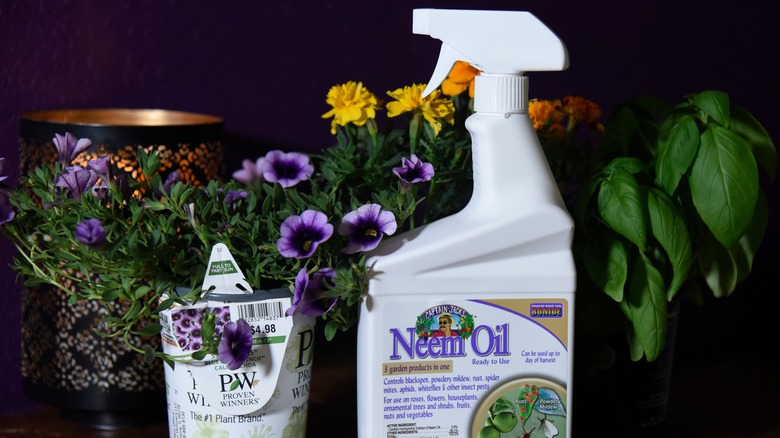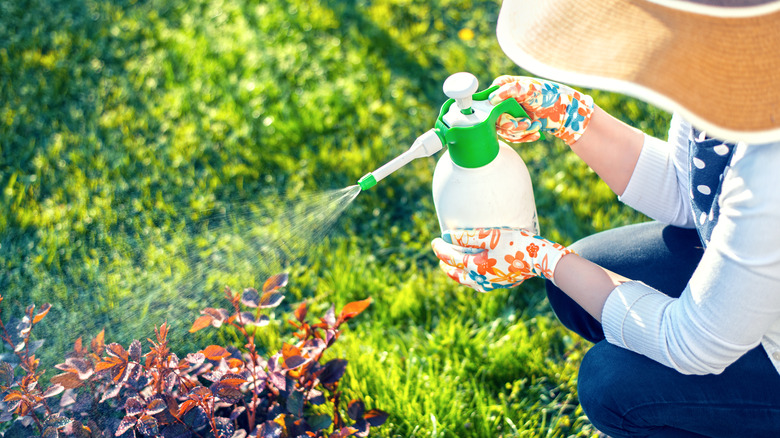The Simple DIY Neem Oil Spray That Keeps Pests Off Of Plants
Gardeners have fought an endless battle in the war against relentless pests who raid their garden. Often reluctant to use pesticides that would banish the good insects you want to avoid killing, they're always on the lookout for solutions. Neem oil was introduced as a natural remedy to help fight pests like Japanese beetles, aphids, and whiteflies, among others. The active ingredient in neem oil, Azadirachtin, is effective against pests as it works to disrupt their hormones and stunts their development.
Pests that are vulnerable to the effects of neem oil can't tolerate the oil and it leads to suffocation. It's important to note that neem oil works best against younger insects that haven't fully developed and can't tolerate the effects neem oil will have on their underdeveloped respiratory system. Mature insects aren't usually affected, instead, they can live on to reproduce. That's not to say that neem oil isn't effective against pests. In fact, neem oil can be effective in reducing the number of new pests by acting as a repellant and throwing off the pests' senses, in addition to killing off the younger ones. Reapplying neem oil as part of a rigorous pest treatment regimen will help to reduce and possibly even eliminate the number of pests over time.
How to make a neem oil spray to get rid of pests
There are a number of ways to get your hands on this age-old potion, but the best way to ensure you know exactly what's going onto your plants is to make the neem oil spray yourself at home. You're going to need a gallon of warm water, make sure the water isn't hot or cold—just warm to the touch. Add 2 teaspoons of mild dish soap to the gallon of warm water. Give this a good shake to fully incorporate the dish soap into the water. Pour 2 tablespoons of neem oil into the dish soap mixture and give the mixture another good shake.
The warmer water will allow the neem oil to dissolve well into the water and the dish soap will work well as an emulsifying agent. Dish soap is also a great tool to use against insects. When it comes into direct contact with insects like aphids and cockroaches, dish soap kills them by removing the wax layer on their bodies which kills them by dehydration. The neem oil will need to be sprayed generously all over your plants every seven days on a repetitive application schedule to ensure it remains effective. Besides pests, neem oil is also great in helping to prevent the spread of fungal diseases such as powdery mildew on your plants.
Tips when using neem oil in your garden
The first and most important thing when working with pesticides is to take necessary safety precautions to protect yourself and everyone in your home. Always wear gloves to protect your skin from oil drips. Test the neem oil spray on a small section of your plants first to make sure they won't have a bad reaction to the spray. Even when it's said to be mild, dish soap can cause harm and damage to plants. Dish soap has the power to cut through the protective layer on plants' leaves even if it's been watered down, leaving them dry and vulnerable to bacteria and diseases.
Neem oil can be just as harmful to plants. Depending on when the spray is applied, neem oil sprays can cause plant burn and damage their foliage. Considering that this spray needs to be generously sprayed to cover the plants entirely, you want to be safe rather than sorry. Apply neem oil spray to plants on cool afternoons or after the sun has set to prevent it from scorching your plants. Remember, neem oil spray isn't a one-time fix and you need to be patient and allow it to work over time. You can also try hand picking insects, setting traps to kill them or attracting good bugs that will chase pests away from your garden. Using pesticides should be a last resort when you've exhausted all other options


